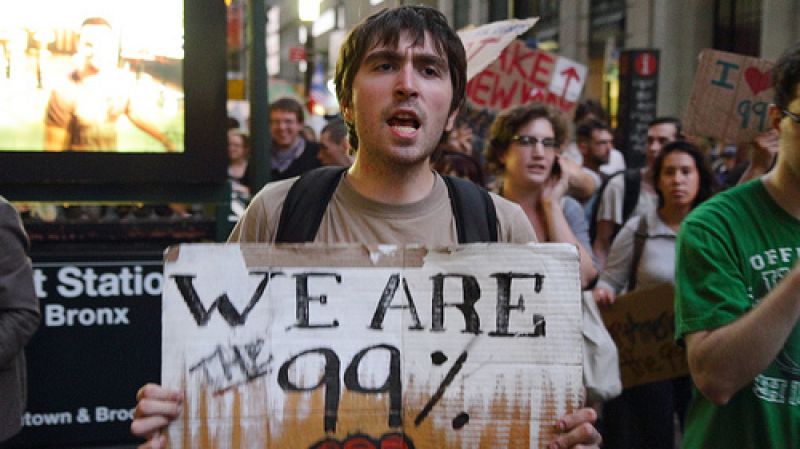Lost in The Gap Between Rich and Poor
Demonizing the eight richest people in the world will not eradicate global poverty

- A report released by Oxfam says eight people own the same amount of wealth as the poorest half of the world’s population.
- Extreme poverty worldwide has been declining over the past two decades, so it is unclear the concentration of wealth has necessarily come at the expense of the poorest.
- In developing countries, taxation brings its own problems, such as corruption or mismanagement.
- Shaming individuals who have profited from their success will discourage entrepreneurial innovation.
- Private initiatives can also redistribute wealth: five of the eight richest people cited have pledged more than half of their wealth to philanthropic causes.
The recent report by Oxfam on wealth inequality certainly makes for a jarring headline: just eight people own the same amount of wealth as the poorest half of the world’s population. It’s an attention-grabbing statistic but looking deeper, says Bertrand Malsch of Smith School of Business, the Oxfam report misses the mark in several ways.
“We can all agree that 30 percent of the world shouldn’t have to live on a single dollar a day,” says Malsch, an associate professor and Distinguished Faculty Fellow in Accounting. “But solutions to that problem might not be where Oxfam believes they are, and their big comparison exercise might be, in the end, a distortion of reality.”
After all, the same numbers that make Oxfam’s report so shocking also make many Canadians look bad as well. “When you’re compared to the poorest people in the world — people who have literally nothing — it doesn’t matter whether you’re super rich or a middle-class citizen, the optics are crippling,” he says. “Anyone who owns a 100k condo in the Greater Toronto Area is 100,000 times richer than 30 percent of humanity, but I’m sure that none of those condo owners feel like they belong to a privileged class.”
The reality is that extreme poverty worldwide has been declining over the past two decades, so it is unclear the concentration of wealth has necessarily come at the expense of the poorest, he says.
Taxation Has Its Own Problems
As a thought experiment, what would happen if the fortunes of the eight men were redistributed to the poorest half of the world? According to Visual Capitalist, that would give each person a lump sum of $118.39.
“That might change their lifestyle for a year, because they’re in extreme poverty,” Malsch says. “The gift of a hundred dollars may be very significant and it might help them out, but only for a really short time. It’s not going to create any kind of richness; it’s going to be spent. There’s no evidence that just taking richness from some and redistributing it to others equally is going to make any difference. Development involves some form of capital concentration.”
Taxation, the principal method of wealth redistribution that Oxfam argues for, brings its own problems. In many developing countries, the good it can bring can be diluted by corruption or mismanagement. Even in developed countries where the state reaps more than 50 percent of people’s wages, high taxation does not necessarily lead to improved health care, education, or poverty rates — and high taxation can drive away individuals who have the means to create new enterprises.
“Clearly states like France and Canada are not, to some extent, underfunded,” Malsch says. If we simply increased taxation, “then what are we left with? Even more money for the state? It is not clear that states all have a very strong track record of spending money efficiently.”
Accounting for Charitable Activity
Most of the eight super-wealthy people identified by Oxfam are doing their part to alleviate the inherent tensions in capitalism. Five of them belong to The Giving Pledge and have promised to give more than half of their wealth to philanthropy. Mark Zuckerberg recently committed to donating 99 percent of his Facebook shares to worthy causes. That kind of charitable activity, Malsch says, raises questions about Oxfam’s report.
“It's very unclear if Oxfam took into account all of those commitments,” he says. “Is the state the only appropriate vehicle to redistribute wealth? What about private initiatives?” He says charitable giving and private initiatives, such as the Bill and Melinda Gates Foundation, sometimes can be more efficient and effective than direct government intervention.
Charitable giving and private initiatives, such as the Bill and Melinda Gates Foundation, can be more efficient and effective than direct government intervention.
What has made a difference in shifting global levels of poverty is job creation fueled by economic growth worldwide. Indeed, many countries are trying to boost entrepreneurship, based on the idea that individual success can produce collective benefits. To Malsch, it is odd that our communities invest so much to support the development of entrepreneurs, yet we’re uneasy when entrepreneurs start to make too much money.
While capitalism and globalization have done much to ease poverty, they come with downsides — such as a wide gap in income distribution — that need to be addressed. But Malsch describes capitalism as “the least worst of the possible systems out there,” and says protectionism ignores many of the benefits that globalization brings. The question is whether we’re prepared to acknowledge that there are downsides to capitalism and globalization and mitigate the problems.
“In the end, this isn’t just an economic issue,” says Malsch. “Whatever the economic system, there’s always a way to abuse the system or take advantage of it — so this is a moral question. How do individual people feel morally bound to others? What do people do when they’re rich? Do they redistribute their wealth, and if they do, how do they do so? How can we encourage them?”
— Kenza Moller